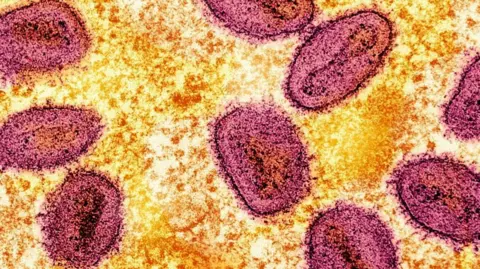
 Reuters
Reuters
Two more cases of a new strain of the mpox virus have been detected in London, in household contacts of the first patient, health officials say.
The two individuals are now under specialist care at Guy's and St Thomas' NHS Foundation Trust.
All three patients were infected with the Clade 1b variant of the virus, which was first detected in central Africa and appears to transmit more easily between people.
Prof Susan Hopkins, chief medical adviser at the UK Health Security Agency (UKHSA), said mpox - formally known as monkeypox - could spread quickly within households and further cases were "not unexpected".
"The overall risk to the UK population remains low," she said.
"We are working with partners to make sure all contacts of the cases are identified and contacted to reduce the risk of further spread."
The agency said those individuals would be offered testing and vaccination if needed.
Mpox is typically spread through close physical contact, and transmission within a household does not mean the virus has been detected in the wider community in the UK.
Mounting concern
Last week, the UKHSA reported the first case of Clade 1b mpox in London in a patient who had recently been on holiday in at least one of the affected countries in Africa and began to feel sick 24 hours after flying home.
The patient developed flu-like symptoms on 22 October and a rash two days later.
An mpox rash of pus-filled lesions can last for up to a month. Other symptoms include fever, headaches and low energy.
Laboratory testing confirmed the infection was Clade 1b. This form of the virus has been causing mounting concern.
It appears able to spread more easily from person to person through physical contact, including sex, than other types of mpox.
Mpox was declared a global health emergency by the World Health Organization in the summer.
In Africa, the Democratic Republic of Congo, Kenya, Burundi and Rwanda have all reported cases of the new Clade 1b strain this year.
The UK, Sweden, India and Germany have all detected infections linked to travel to affected countries.
This is a different outbreak to the one that primarily affected gay, bisexual and other men who have sex with men in 2022, called Clade II. These mpox infections still happen at low levels.

 2 weeks ago
10
2 weeks ago
10









